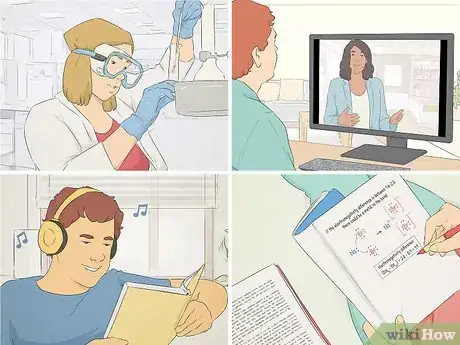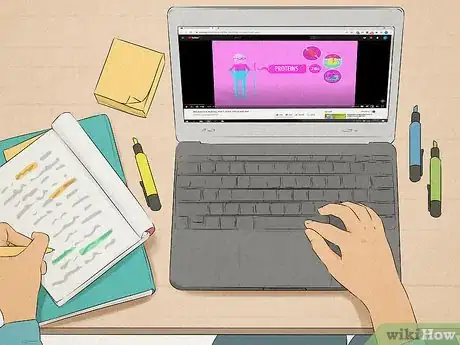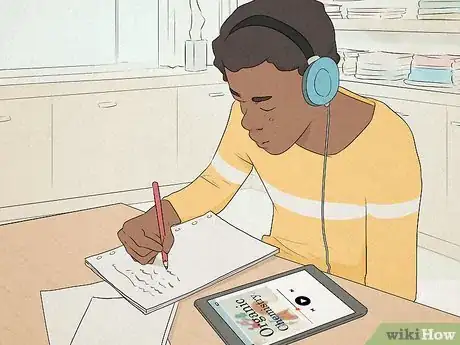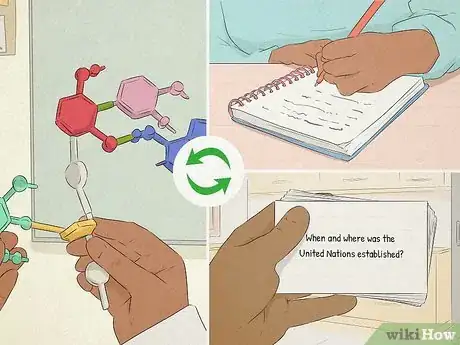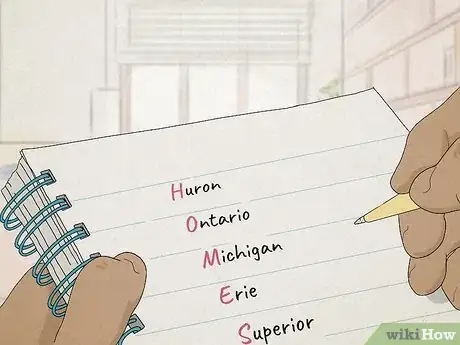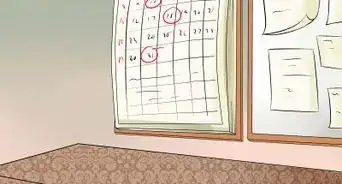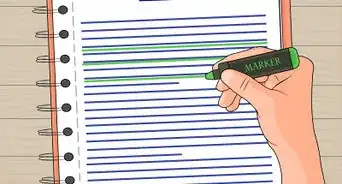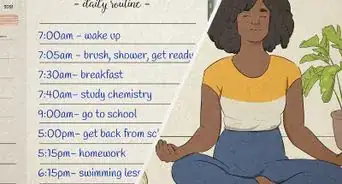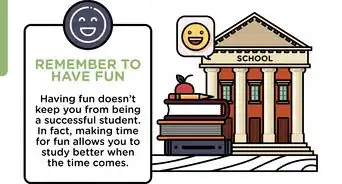This article was co-authored by Ted Dorsey, MA. Ted Dorsey is a Test Prep Tutor, author, and founder of Tutor Ted, an SAT and ACT tutoring service based in Southern California. Ted earned a perfect score on the SAT (1600) and PSAT (240) in high school. Since then, he has earned perfect scores on the ACT (36), SAT Subject Test in Literature (800), and SAT Subject Test in Math Level 2 (800). He has a BA in English from Princeton University and a MA in Education from the University of California, Los Angeles.
There are 7 references cited in this article, which can be found at the bottom of the page.
wikiHow marks an article as reader-approved once it receives enough positive feedback. In this case, 95% of readers who voted found the article helpful, earning it our reader-approved status.
This article has been viewed 166,745 times.
Studying can feel like an enormous challenge, especially when tests and exams are looming. However, study is about learning for self-betterment, not just to pass exams. And since knowledge takes a while to accumulate and be well understood, the more time you give yourself to thoroughly delve into a subject, the more you'll understand it and find it holds you in good stead for the future. This article will help you to find studying easier than perhaps it has been to this point.
Steps
Using your best learning approaches
-
1Find out what your learning style is. People have different ways of learning that make the information easier to understand and retain. Some people find visual aids are the most useful, while others need to hear the content of the learning before it makes complete sense. Others again need to be moving about, touching and making things in order to be able to learn. Once you have worked out which style best suits your learning, you can put it to good use in developing key ways of studying that work for you. There are generally 4 types of learners:[1]
- Visual learners: these are people who prefer to see some sort of illustration to further explain a subject.
- Auditory learners: these are people who rely on hearing and speaking to understand information and instructions. They may struggle with understanding written instructions.
- Kinesthetic learners: these are the "do-ers". They prefer completing hands-on activities and experiments to understand what they are learning. These people excel in science related subjects because of the hands-on atmosphere they present.
- Reading or writing-preference learners: these, as the name suggests, prefer reading or writing the information repeatedly to understand it.
-
2Learn through seeing. If you are a visual learner, watch educational videos about the subject instead of reading the textbook. You may also use graphic organizers and other illustrations to understand a specific topic.[2]
- Visual may make charts, flow maps and make information visual.
Advertisement -
3Learn through listening. If you are an auditory learner, try purchasing an audio version of the textbook being used, or simply read it aloud. As opposed to writing notes, record them with a tape recorder and play them back to study.[3]
- Auditory can tape lectures, read info aloud, tape notes/textbook readings and talk to others about it.
-
4Learn through doing. If you are a kinesthetic learner, think of some creative activities and/or experiments to review information.
- Tactile can make flap books, become the teacher, and ask on ways to make your info hands on.
-
5Learn through reading and writing. If you are a reading or writing-preference learner, all you have to do is read whatever information you are required to know. It might also help to paraphrase the information and write it down, just so you're sure you understand it.[4]
-
6Switch your learning styles around now and then. Even if you decide that you are definitely a certain style of learner, try learning techniques from other styles of learners. Apply these to your studying, to broaden the interest and to help round out the ways in which you learn best. It's not a good idea to be too strict about only using one style, or you risk being bored and missing out on a great tool meant for another learning style. Mix it up in ways that work best for you.
Using specific habits to ease studying
-
1Choose a quiet place to study. Removing noise and distractions can help you to focus better and get on with the studying within a set block of time. That said, some people actually do study better with hubbub and people around, so just as with learning styles, if this latter approach better suits you, use it to your advantage and study in a cafe, a work-group space or similar less quiet zone.[5]
- If you go to a public place or a friend's house, bring all that you need with you and keep an eye on electronics in public areas.
-
2Listen to music. This doesn't work for everyone but some people find that it can help to listen to music, especially classical music or instrumental music. This tends to be a "now and then" thing though––some days you may find the music soothing and helpful, while other days it's annoying and distracting. Don't treat music as an always must-have, as your use for it will vary.
-
3Take regular breaks when studying.[6] Study in 15 minute chunks and take 5 minute breaks. Or study for half an hour to 55 minutes, then take a break. Get into this habit and stick to it, as it's good for your body and brain both to have a stretch, a walk around and a change of scenery for a few minutes.
-
4Create a study group of people who learn the same way you do. It's easier to study with people who learn the same way you do.
-
5Make a memory prompt from your studying. The following exercise will help you to develop a quick prompt for recalling lots of text:[7]
- Start reading the text, with the aim of trying to understand it. If you don't understand anything, then pause and read again.
- Pick up important and catchy words in the text. Consider these your "keywords."
- Write the keywords down on paper.
- Take the first letter of each word. Write down that letter on the next line of the paper.
- After you get all the letters, make words out of them.
- You can make a single word or a sentence too.
- The trick in making these words is that you can make words which you use daily e.g, your friends name or a joke which makes you and your friends laugh,or a strict teacher etc.
- By doing this, you can easily get a hold of the important words which were listed in the text.
-
6Use rewards. A reward system can help you to get through large or challenging learning stages. Set goals for completing sections of learning, followed by such rewards as a night off from studying, a movie with a friend, a piece of chocolate cake, whatever. Keep the rewards realistic, affordable and small. Leave any large reward for completion of everything, tests and exams included.[8]
Expert Q&A
Did you know you can get expert answers for this article?
Unlock expert answers by supporting wikiHow
-
QuestionWhat's a trick for learning things quickly?
 Ted Dorsey, MATed Dorsey is a Test Prep Tutor, author, and founder of Tutor Ted, an SAT and ACT tutoring service based in Southern California. Ted earned a perfect score on the SAT (1600) and PSAT (240) in high school. Since then, he has earned perfect scores on the ACT (36), SAT Subject Test in Literature (800), and SAT Subject Test in Math Level 2 (800). He has a BA in English from Princeton University and a MA in Education from the University of California, Los Angeles.
Ted Dorsey, MATed Dorsey is a Test Prep Tutor, author, and founder of Tutor Ted, an SAT and ACT tutoring service based in Southern California. Ted earned a perfect score on the SAT (1600) and PSAT (240) in high school. Since then, he has earned perfect scores on the ACT (36), SAT Subject Test in Literature (800), and SAT Subject Test in Math Level 2 (800). He has a BA in English from Princeton University and a MA in Education from the University of California, Los Angeles.
Master's Degree, Education, University of California Los Angeles
-
QuestionHow can I improve my memory?
 Community AnswerMemory works through emotion, interest, and association. The more interest you have in a subject, the better it sticks, so find something that interests you. Explain how the bits of information are connected to one another, making a story out of it rather than just memorizing parts. Emotion can be tapped by finding a passion associated with the subject. Find your motivation.
Community AnswerMemory works through emotion, interest, and association. The more interest you have in a subject, the better it sticks, so find something that interests you. Explain how the bits of information are connected to one another, making a story out of it rather than just memorizing parts. Emotion can be tapped by finding a passion associated with the subject. Find your motivation. -
QuestionHow can I make studying easier?
 Community AnswerSet aside time free from distractions during study. Put the phone away, close any other tabs on the computer not used for study. Study with a clear mind, having rested well, eaten healthily, and exercised mildly beforehand. Use thirty-minute bursts of intensive study with brief breaks in-between. Review each section as you study it, applying the knowledge by writing and answering questions, rather than memorizing. Write bullet point notes that highlight the key points of the subject, relating each point to the lead topic.
Community AnswerSet aside time free from distractions during study. Put the phone away, close any other tabs on the computer not used for study. Study with a clear mind, having rested well, eaten healthily, and exercised mildly beforehand. Use thirty-minute bursts of intensive study with brief breaks in-between. Review each section as you study it, applying the knowledge by writing and answering questions, rather than memorizing. Write bullet point notes that highlight the key points of the subject, relating each point to the lead topic.
References
- ↑ https://www.learning-styles-online.com/overview/
- ↑ https://www.thethings.com/easy-study-tips-visual-learners/
- ↑ https://education.media/best-study-tips-for-auditory-learners
- ↑ https://ace.fsu.edu/sites/g/files/imported/storage/original/application/9ec2460d5d1ca9000c510349f57396b1.pdf
- ↑ https://www.wgu.edu/blog/improve-online-study-environment1712.html
- ↑ https://greatist.com/happiness/better-study-tips-test#Stay-Focused
- ↑ Ted Dorsey, MA. Academic Tutor. Expert Interview. 11 December 2019.
- ↑ https://greatist.com/happiness/better-study-tips-test#Stay-Focused
About This Article
While studying might feel frustrating or even unproductive at times, you can make it easier by developing good habits. Take regular breaks to relax your body and brain. Find a routine that works for you, like studying for 55 minutes and breaking for 5 minutes, and stick to it. Keep yourself motivated with rewards, like earning a favorite coffee drink every time you finish learning a section of material. Another way to make studying easier is to figure out what kind of learner you are. For example, if you're a visual learner, use illustrations to better understand the material. Or, if you're more of an auditory learner, talk about the information or have a conversation about the material. To learn how to find a study group, keep reading!
